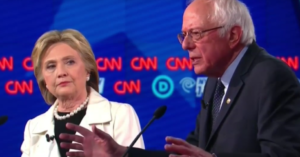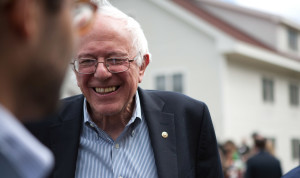What the 2016 Democratic and Republican Parties Stand For: A Post-Convention Look
The two big messages of the Democratic Convention were Hope and Inclusion. Hope, of course, was one of the two themes (along with Change) that propelled Barack Obama to the presidency in 2008.
The danger with memes like Hope and Change is that they leave people greatly disappointed when not much appears to change. Obama actually has a pretty powerful record of accomplishment (and here’s a shorter but more up-to-date list prepared by the Democratic Party). But he’s somewhat diffident about claiming it—and his legacy is much less than it could have been because of the concerted effort of the GOP to deny him any victory no matter how small. Here, for instance, is Mitch McConnell, early in Obama’s presidency, saying the President is not sufficiently bipartisan, despite Obama’s unprecedented and massive outreach to the other side at the expense of that agenda of hope and change—something even Fox News noticed. (Of course, by 2010, McConnell was openly saying his top priority was making sure Obama was a one-term president.)
I have plenty of issues with both Obama and with Hillary Clinton—but government is supposed to be bipartisan, not spoil-sport-losers-blocking everything. The Democrats even allowed George W. Bush to govern, despite his awful, destructive policies from which the country is still recovering. That Obama has been able to get anything done in this climate (and as those two links above prove, he’s done quite a bit) is remarkable. That the Republican Party has thwarted the will of the people over and over again these 8 years is shameful.
Obama also has a tendency to “roll over and play dead” unnecessarily. To name one example, that he gave up so easily on filling the Supreme Court vacancy caused by Scalia’s death is shocking—and very bad precedent. As a former community organizer, Obama should have had a clue about how to break he deadlock—keep the apparatus that twice elected him president active, to deluge Republican legislators with calls and letters supporting particular pieces of Obama’s agenda—to keep people involved and motivated while at the same time disassembling Republican intransigence, making its revelry in being “The Party of No” politically difficult. Obama could have organized a backlash in the 2010 election and accumulated massive majorities in both houses. But he let his eager champions wither on the vine.

Inclusion may not be as powerful as hope, but it’s a very strong meme nonetheless. This year’s Republican candidate openly embraces hostility to inclusion—attacking Mexicans and Muslims along with immigrants in general, mocking disabled people, and even attacking the patriotism of decorated war hero Senator John McCain. So it’s a good move for Hillary Clinton to reclaim the emotional territory she gave up to both Sanders and Trump during primary season—and in this case, I do think it’s genuine. The first night of the convention, especially, was all about outreach to those who’ve felt disenfranchised (including the millions of supporters of Bernie Sanders). Clinton’s good dose of Policy Wonk may also be the antidote to Trump’s sketchy sound-bite promises about how he would govern.
The themes of inclusion, hope, and competence were in tremendous contrast with the Republican Convention, whose dominant message was fear—expressed in xenophobia. The other message of the Republicans was “we don’t have to give a crap about people we can beat up”–a big rallying point for those who agree, but a big push-away for anyone who might be a potential victim–and that’s a LOT of people. This is essentially the message of fascism, and it scares me to see it coming out of the mouth (and Twitter feed) of a nominated major-party candidate for President.
And this is why I will vote for Hillary even though my own politics are closer to Jill Stein’s, and even though I live in a state that will vote Democratic no matter what. I am not thrilled about voting for Hillary, but I will vote for her. I consider Trump the greatest threat to democracy and liberty in my lifetime. His repeated use of Hitlerian memes is very troubling. And I think very deliberate. I want Trump’s margin of defeat to be so “YUGE” that we never see his ugly politics again.
Looking at the election as a whole, I’d bet that Trump, a master marketer for decades, has studied NLP (Neurolinguistic Programming—an extremely powerful approach to getting inside people’s minds through the use of deep psychological triggers) and is far better at getting his (loathsome) message across than Clinton is. The Republicans have been using sound bites that appear to be based in NLP techniques for over 30 years, but Trump has taken it much deeper. Clinton, by contrast, is an old-school politician who hasn’t quite figured out the 21st-century shift in marketing from push to interactive. And Sanders has probably not studied marketing but he’s a natural. His brand is wrapped in an integrity that neither party nominee can offer—and he has a long background in (and deep understanding of) community organizing as well as electoral politics. When he started as a politician, Vermont was not exactly a progressive hotspot. I believe he helped create the climate where his state is now among the bluest in the nation.
Interestingly, all three are around the same age, spanning from Clinton’s 68 to Sanders’ 74 (Trump just turned 70)—yet the oldest, Sanders, had the strongest appeal to youth. And the younger candidates, from O’Malley to Rubio, were all eliminated months ago.



